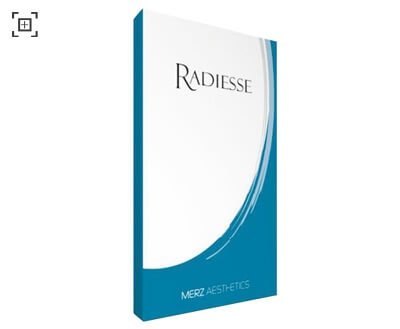 What is Radiesse?
What is Radiesse?
Radiesse is a sterile, latex-free, non-pyrogenic, semi-solid, cohesive subdermal device. The principle durable component of Radiesse is synthetic calcium hydroxylapatite, a biomaterial with over twenty years of use in orthopedics, neurosurgery, dentistry, otolaryngology and ophthalmology.
Important information about Radiesse
Calcium hydroxylapatite is the primary mineral constituent of bone and teeth. The semi-solid nature of Radiesse is created by suspending calcium hydroxylapatite in a gel carrier that consists primarily of water (sterile water for use) and glycerin. The gel structure is formed by the addition of a small amount of sodium carboxymethylcellulose. The gel is dissipated in vivo and replaced with collagen and other soft tissue ingrowth, while the calcium hydroxylapatite remains at the site of use to form a scaffold for the new tissue formation. The result is intended to be long-term soft tissue
Indications for Radiesse correction
Radiesse ™ can be used for correction:
- Nasolabial folds, between the mouth and nose.
- "Lines of puppets" so-called "smile wrinkles" in the corners of the mouth.
- Radial lip wrinkles: wrinkles above the upper lip.
- Cavities of the skin and scars, for example, acne scars.
- Sunken cheeks caused by atrophy.
- Nose and chin for correction of dents, bumps.
- Lower jaw: improving the contours in this area.
- Hands to reduce the severity of the veins and bones of the hands of aging.
WARNINGS
You should not use:
- During pregnancy or lactation, as well as against infection.
- If you are taking aspirin or other medications, please consult your physician.
-
- If you have any other fillers, please, notify your physician and consult him.
Duration of activity
Duration of Radiesse, provides a more lasting effect than fillers based on hyaluronic acid, such as Restylane or Perlane , because it slowly replaced by the body tissue and dissolves slowly within 18 months or longer.
What are possible side effects?
May occur normally associated reactions with the use swelling: pain, itching, discoloration and tenderness at the use site.



 What is Radiesse?
What is Radiesse?